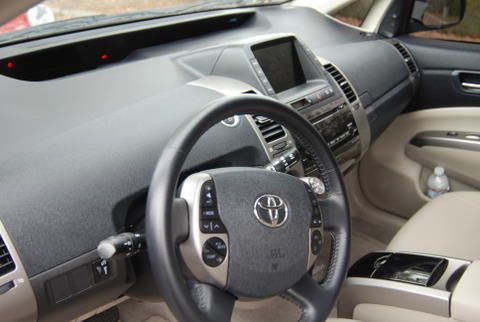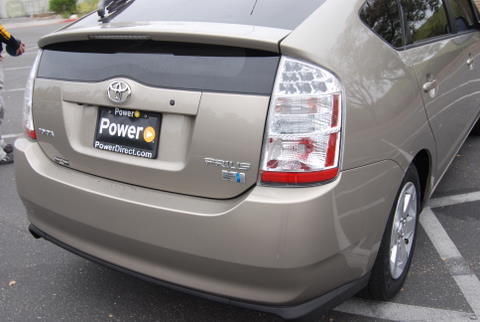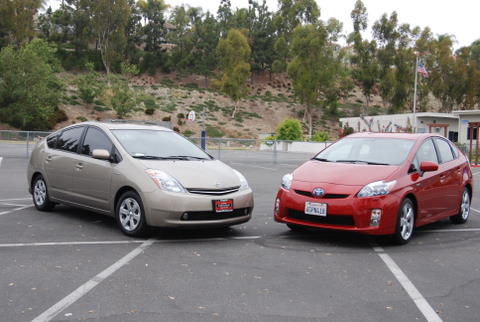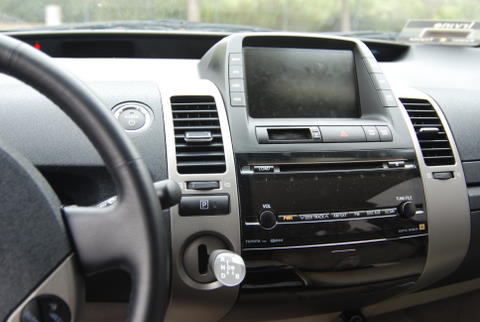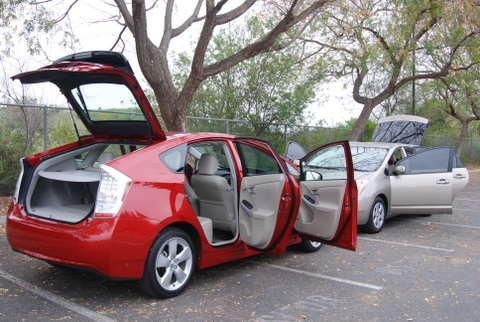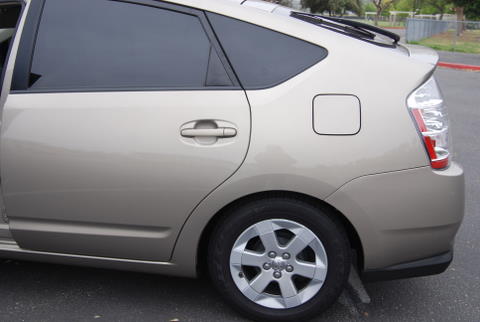Used Hybrid Buying Guide: Toyota Prius (2004-2009)
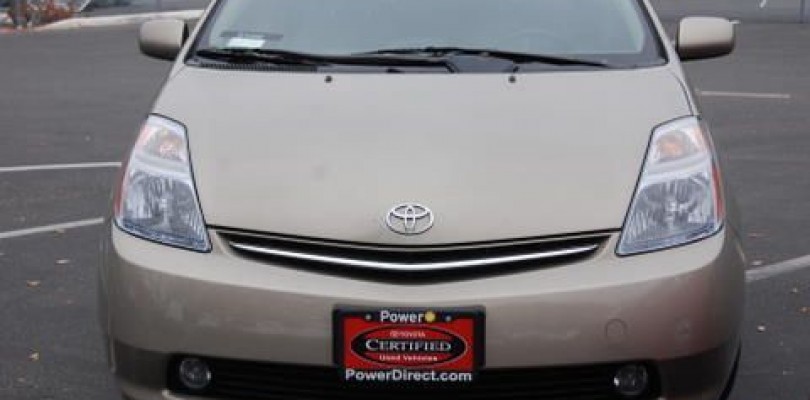
Used Hybrid Buying Guide: Toyota Prius (2004-2009)
By James Hamel
Toyota has sold millions of copies of its hybrid Prius and in doing so has revolutionized the auto industry. While even Toyota admits that hybrid drive technology (a gas engine and electric battery working together to optimize fuel economy) isn’t the final answer to the “green” question, most every automaker is now working on some sort of competing hybrid concept.
2009 was an auspicious year in the Prius story what with the introduction of the more powerful yet more fuel efficient 2010 Prius. While the 2010 Prius added some bonuses like a more luxurious interior and a solar roof panel to power the air conditioning when you are parked it is still generally the same mechanical concept. And in light of the stellar reliability history of the 2004-2009 Prius (also known as model NHW20), it really does make sense to have a look at a used model—even in light of possible battery replacement costs. This used guide intends to help you make the best decision as to model year, mileage and condition when searching for the best Prius your money can buy.
An Owner’s Story—Sometimes referred to as the “Toyota Pious” due to its unfortunate association with Al Gore and his “Inconvenient/Inaccurate Truths,” most Prius owners are normal people just looking for a fuel efficient vehicle with low running costs. And on that count, the Prius delivers. If you are looking for a vehicle that will help you save the earth might I recommend you buy a used ten-speed bicycle off of EBay? Preferably in banana yellow.
Kelly Scott lives in Southern California and travels epic mileages as part of her job as a real estate appraiser. Kelly says she usually averages around 45-48 miles per gallon according to the on board computer in her Prius. Her mileage lows of around 40 miles per gallon usually only happen on hot days when the air conditioning is set to high and she is carrying heavy loads of passengers and cargo.
Speaking of passengers, Kelly finds many of the hi-tech features on the Prius invaluable in helping out with her duties as “mommy” to her son Luke and daughter Julia Rose. “The smart key is to die for when schlepping Luke around. I can just leave my keys in my pocket and stand next to the front door or trunk and it unlocks. No more digging in my purse. Sometimes I wish our front door to the house was like that too!”
There is one optional extra available on the new model that Kelly wishes she could have on her older Prius, “Another feature I would love now that I have kids is an auto-start to get the AC running on hot days. My kids still have to ride in back and I live in the San Fernando Valley so the car can get really hot inside. So I usually have to get in and turn on the car to get the AC going before I start loading groceries or get Luke and Julia in their seats. It’s kind of a hassle.”
One thing Kelly loves about her Prius is all of the storage spots and cubbies. But she swears she is not a hoarder. “It has tons of storage in unexpected places – 2 glove boxes, cup holders, huge center console with a drawer underneath that I didn’t even find for the first 5 months! I like the AUX jack for my iPod but would LOVE a central docking station. I still haven’t set up the voice command features and probably won’t – an unnecessary bell/whistle I can live without. The backup camera is really handy for parallel parking but not something I couldn’t live without.” An auxiliary input jack? Maybe someone needs to introduce Kelly to the newfangled notions of the USB port and Bluetooth audio streaming but we digress.
Although her Prius came very well equipped with hi-tech features, Kelly Scott has found that in all the miles that have passed beneath its tires that that she has rarely put them to much use. “The navigation system was actually kind of difficult to figure out. It’s not very user friendly and I had to actually read the manual to learn how to operate it. It’s also DVD based, so instead of being updated periodically like the Garmin GPS my husband Lee uses you have to go buy an updated disk if you are missing too many new streets. That has only happened for me a few times in new construction areas. And the nav system won’t let you input an address or find POI (Point of Interest) while the vehicle is in motion. Even with a passenger in the front seat! It does, however, have a pretty good POI database which has come in very handy when I want to find a Starbucks or a park where the kids can take a quick play break.”
But what is Kelly’s biggest electronic pet peeve regarding her Toyota Prius? Let’s just say it has something to do with how difficult it is to access the automatic temperature AC controls. “To lower the temperature you have to press the electronic screen and then hold the down arrow until it gets to the right page. I would much rather have a knob to turn or button to press on the dash, especially if you are trying to follow directions on the GPS at the same time.
To optimize her time as a Prius owner Kelly has often times called on the experience of other Prius owners on Prius specific internet message boards. “It used to beep INSIDE the car while it was in reverse but I found a “cheat code” on the internet to make that stop. It was seriously annoying.” Wow, it appears that Kelly is quite the detective, much like a person you would find in an Agatha Christie novel, one of her favorite authors. And the fact that Kelly actually referred to her owner’s manual when she had a question puts her among the 5% of the population that is smart enough to actually do so.
But it was Kelly’s first bit of internet research that really paid serious dividends during her time with the Toyota Prius she nicknamed “Penny Prius,” “You can really adjust your driving style to maximize mileage. I read up a little on it when I first got Penny and found that it’s actually better to accelerate fast and then maintain a “cruising speed”. The computer shows you what your current MPG is and if it’s using the gas or battery (but I can feel it now). I actually get the best MPG when in traffic on the freeway around 30-35 MPH. I can just use the battery power and coast when necessary. I usually leave a nice big space between me and the next car to keep the stop/start system from turning on the gas engine.”
Maintenance costs haven’t been much higher than they were for Kelly’s last car—a Honda Civic EX coupe. Kelly has had nothing break and has suffered no mechanical breakdowns. She services her Prius every 5K miles or every 6 months at her local Toyota dealer and pays about $169 for minor oil change/oil filter/air filter/inspection services and forks over about $325 for the “major service” at 30K miles. Those are very reasonable prices especially in light of the fact that they come from a dealership service department. With cars this age out of warranty, finding an independent garage would be smart.
So would Kelly buy another Toyota Prius? While she would love to upgrade toa newer Prius she wonders if she might be better served by something with a bit more room. “I got the Prius before I had Luke Julia and to be honest all of their “stuff” takes up most of the available room. So I would probably want to look at something at least a little bit bigger.” Did you hear that Toyota? To take care of their ever expanding needs, the Scott household recently purchased a 2014 Kia Sorento SX 7-passenger SUV. It is not a hybrid.
What to Look For—All Prius models come with a 8 year/ 100,000 mile warranty on the battery so they will replace it if it runs out of juice or stops functioning before then. New replacements at a Toyota dealer usually run about $2500 but they should give you a $400 salvaging rebate for your old unit. Slightly used battery packs from totaled cars are on sites like EBay at prices ranging from $400-$1400 but you are really taking your chances going that route. No one is sure exactly how long Prius batteries last but most owners say they go at least 150,000 miles before showing any noticeable power degradation. So you might need to worry more about the doors falling off before the battery ever fails you.
As many owners use their Prius as high mileage commuters or as company vehicles be sure that the car you are looking at isn’t a salvage unit (meaning it was “totaled” by an Insurance company) and that the mileage is correct. A CARFAX report should tell you everything you need to know.
Used prices for the Prius can vary month to month based on gas prices. When gas prices were at their peak a while ago many used Priuses were selling for close to their original MSRP. Many “green” environmentalists also insist on shunning used examples with the leather option as the methane gas emitted by herds of cattle is allegedly the leading cause “global warming.” This is one of the few times when buying the “fully loaded” version of a new car can really hurt your resale value in the long run.
Most used buyers are looking for Prius models equipped with navigation, cloth seats, keyless entry, back-up camera and the enhanced JBL audio system. Although most buyers aren’t aware of the benefits the Touring models do come with an anti-skid system—very helpful if you live in a rainy or snowy climate.
Used Prius Prices and Depreciation—While the Prius’ reliability in this generation ensures you will be spoiled for choice as to color, specification and budget, it is getting on in years so prices have gotten pretty darn low especially for high mileage models. Although a new battery is now about $400 to replace, if the Prius is over 100,000 miles ask if it has been replaced and if not ask for the price to be lowered accordingly.
Recalls, Problem Areas and Maintenance Requirements—Aside from the aforementioned possibility of needing to replace the batteries, Prius owners have very reasonable maintenance costs. Do keep in mind that if you are buying a used Prius with a questionable CVT automatic transmission that replacement units currently cost a whopping $9,350. These CVT automatics can make groaning noises under load when going uphill but other than that they should perform seamlessly. If the operation of the transmission gives you the slightest pause don’t walk away—run away.
Parts prices, while generally higher than average, aren’t necessarily worse than with other new cars. The only other parts that seem kind of expensive are the alternator at $1,305 and the air conditioning compressor at $1,800. But seeing as this is a Toyota, these parts will likely never need replacing. Just do be aware that if they do break their replacements can get pricey. So be sure to confirm that the air conditioning blows cold air before you buy any used Prius.
Service bulletins are minimal especially considering the complexity built into every Prius. Most of the service bulletins are for 2004-2005 units.
- Brake lights may stay illuminated and to fix you may need to replace the entire pedal assembly—(2005-2006 models
- Check engine light may come on due to sticking coolant control valve—(2004-2006)
- A coolant leak may develop in a converter assembly but this is covered by an extended 96 month/100,000 mile warranty—(2004-2006)
- Use of the wrong engine oil viscosity may trigger “engine will not start” light on dash—(2004-2005)
- Fuel gauge may be inaccurate requiring replacement of gas tank and filler neck—(2004)
- Brake pedal may squeak and if brake fluid bleeding does not help an actuator may need to be replaced—(2004-2006)
There were reports of “unintended acceleration” from some Prius owners but it turns out that it was just improperly installed floormats getting jammed against the accelerator pedal that caused the “problem.” This is the only Prius “recall” for this model and pretty much just entails your Toyota dealer checking to make sure your floormats are securely installed.
The Prius needs servicing either every 6 months or 5,000 miles. This usually entails oil change, oil filter change, air filter change, inspection and tire rotation. At 30K miles Toyota recommends a cabin air filter change, brake fluid bleed and a service on the rear brakes. Many owners don’t realize the complexity of their brake regeneration system and try to skip this service. That is not highly recommended and can void your warranty with the manufacturer. With a car this complex it makes sense to follow manufacturer’s service recommendations as closely as possible.
Competition—If you don’t drive that many miles a Honda Civic, Mazda3 or Chevy Cruze sedan are less expensive proposition to consider. If you do love to have the latest high mileage car do check out the VW Jetta or Golf TDI as they don’t require you change your driving style and are growing plentiful on the used market. But if you can’t quite swing the payment on a brand new Prius, a used model really does make a whole lot of sense.
Photos by Tina Smith

